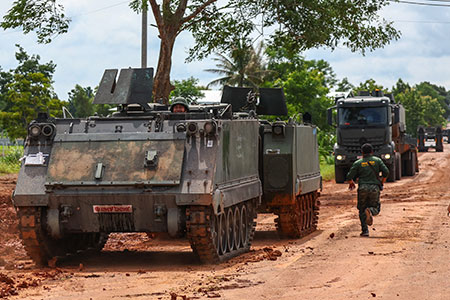
The recent border flare-up between Cambodia and Thailand was widely reported as the latest chapter in a long-standing territorial dispute over an ancient temple. However, a deeper analysis suggests the conflict’s true origins lie not in history, but in the modern, high-stakes world of organized crime, illicit gambling, and intense international political pressure.
This alternative narrative, supported by reporting from publications like France’s Le Monde and exiled Cambodian opposition leader Sam Rainsy, paints the border tension as a deliberate provocation. They allege that Cambodia’s powerful ruling elite, led by patriarch Hun Sen, manufactured the crisis in retaliation against Thailand. The triggers were reportedly Bangkok’s recent crackdown on cross-border cybercrime syndicates operating from Cambodia and, crucially, the Thai parliament’s decision to shelve a bill that would have legalized casinos, dashing lucrative plans for a cross-border gambling empire.
Paradoxically, while lashing out at its neighbor, Cambodia has launched its own unprecedented crackdown on the very cyber-fraud industry at the heart of the dispute—a criminal enterprise whose revenues are believed to exceed half of the country’s GDP. In a sweeping operation, Cambodian authorities have targeted the syndicates that critics have long claimed operate with protection from, and for the benefit of, the ruling family’s network.
This apparent ‘self-revolution’ is not occurring in a vacuum. The new government, led by Hun Sen’s son, Prime Minister Hun Manet, is acting under immense pressure from global powers. China, a key ally, has pushed for the cleanup through a new joint law enforcement agreement. Simultaneously, the United States has applied financial pressure, with the Treasury Department targeting financial institutions like the Huione Group, allegedly linked to the Hun Sen family, as a primary money laundering concern and moving to cut off its access to the U.S. financial system.
The crackdown is also viewed as a significant political move by Prime Minister Hun Manet to consolidate his own authority and burnish his international credentials, potentially at the expense of his father’s old guard. Reports that police raids uncovered evidence implicating high-level officials suggest a move to dismantle the networks that underpinned the old system. This internal power struggle is unfolding under the guise of an anti-crime campaign, triggered by external pressure.
Ultimately, the border conflict appears to be a smokescreen for a much larger drama involving an internal power transition, a forced reckoning with a criminalized economy, and the escalating geopolitical rivalry between the U.S. and China in the region. While the current campaign may serve the interests of Beijing and Hun Manet, observers conclude that for Cambodia to truly shed its reputation as a ‘haven for scammers,’ it will require a fundamental overhaul of its justice system and a severing of the corrupt ties between state and business.
